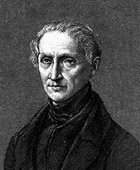Joseph von Eichendorff
(1788–1857). Poet and novelist Joseph von Eichendorff is considered one of the great writers of the German Romantic movement. (In literature and other arts, the Romantic movement exalted feeling and the imagination above rigid forms and traditions.)
Eichendorff was born on March 10, 1788, near Ratibor, Prussia (in what is now Poland). From a family of Silesian nobility, Eichendorff studied law at Heidelberg, where he published his first verse and became acquainted with the circle of Romantics. Continuing his studies in Berlin in 1809–10, he met the leaders of the Romantic national movement. When the Prussian war of liberation broke out in 1813, Eichendorff enlisted in the military and fought against Napoleon.
The Napoleonic wars, which brought about the decline of the Eichendorff family, are the source of nostalgia in his poetry. During these war years he wrote two of his most important prose works: a long Romantic novel, Ahnung und Gegenwart (1819; Premonition and Present), which is pervaded by the hopelessness and despair of the political situation and the need for a spiritual, rather than a political, cure for moral ills; and Novellen des Marmorbilds (1819; Novellas of a Marble Statue), which contains supernatural elements and is described by Eichendorff as a fairy tale. After the war he held posts in the Prussian civil service in Danzig and Königsberg (now Gdansk, Poland, and Kaliningrad, Russia, respectively) and, after 1831, in Berlin.
The poems in Eichendorff's collection Gedichte (1837; Poems), particularly those expressing his special sensitivity to nature, gained the popularity of folk songs and inspired such composers as Robert Schumann, Felix Mendelssohn, and Richard Strauss. In 1826 he published his most important prose work, Aus dem Leben eines Taugenichts (Memoirs of a Good-for-Nothing), which, with its combination of the dreamlike and the realistic, is considered a high point of Romantic fiction. In 1844 he retired from the civil service to devote himself entirely to his writing, publishing a history of German literature and several translations of Spanish authors. Eichendorff died on Nov. 26, 1857, in Neisse.
Biography from: Britannica.com |






